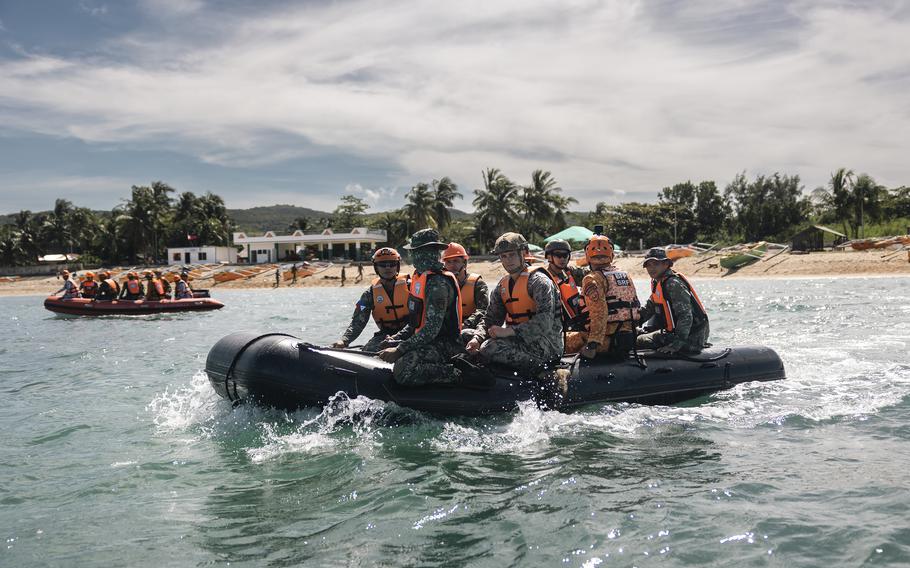
U.S. and Philippine service members train during the annual Kamandag exercise at Camp Cape Bojeador, Philippines, Oct. 16, 2024. (Shaina Jupiter/U.S. Marine Corps)
Japan and the Philippines plan to remind the new U.S. administration about the need for continued American commitment to Indo-Pacific security, according to the U.S. allies’ foreign ministers.
The two nations have boosted security cooperation with the United States under outgoing President Joe Biden amid aggressive actions by China in disputed areas of the South China and East China Seas.
Japanese Foreign Minister Takeshi Iwaya, during a Wednesday press conference in Manila with his Philippine counterpart, Enrique Manalo, said the pair are committed to communicating with President Donald Trump’s administration after he takes office Monday.
“We will approach the next U.S. administration to convey that constructive commitment of the United States in this region is important also for the United States itself,” Iwaya said, according to a video of the press conference posted on YouTube.
A Philippine journalist asked whether Trump might scale back or put a price on commitment to the region.
Maintaining and strengthening the multilayered cooperation among the U.S., Japan and the Philippines is important amid the increasingly severe strategic environment, Iwaya said.
The three nations are cooperating on maritime security, resistance to economic coercion, resilient critical infrastructure and cyber security, he said.
Iwaya noted the strategic importance of sea lanes in Southeast Asia and economic growth in the region.
Manalo told reporters that the Philippines and Japan would work with like-minded states, including the U.S., to uphold a rules-based international order and work for a free and open Indo-Pacific.
The diplomats’ comments follow reports that China’s “monster” coast guard cutter, the 541-foot-long CCG 5901, has been operating in Philippine waters since Jan. 4.
In recent days, the vessel came within 70 nautical miles of Zambales province, home of the former U.S. naval base at Subic Bay on the Philippines’ main island of Luzon, the state-run Philippine News Agency reported Monday.
Philippine assets are challenging Chinese vessels in its territorial waters daily, Philippine National Security Council assistant director general Jonathan Malaya told reporters the next day.
“Right now, we have two Philippine Coast Guard (PCG) vessels shadowing them, closely monitoring them,” he said, according to the Philippines News Agency. “We have sent assets also from our forces and from the PCG aerial assets to continue monitoring them.”
Beijing’s territorial claims in the South China Sea are legitimate concerns for the international community because they link directly to regional peace and stability, Iwaya said at Wednesday’s press conference.
“Japan strongly opposes any attempt to unilaterally change the status quo by force or build up tension in the region. We strongly ask for easing of tensions,” said Iwaya, who is scheduled to attend Trump’s inauguration in Washington, D.C.
Japan and the Philippines plan to move forward on agreements to facilitate their troops training in each other’s territory, he said.
This spring, Japan for the first time will join the annual, large-scale Balikatan military exercise in the Philippines. Details about the training are being finalized, a spokesman for Japan’s Joint Staff said by phone Thursday.